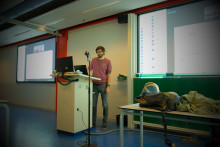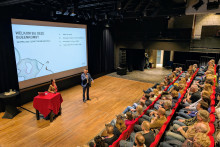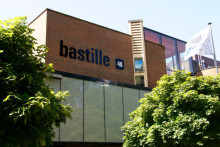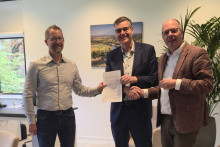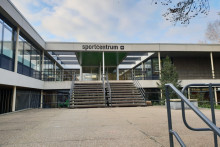In recent years, the University of Twente has seen a steep increase in student numbers. For the past two years, this was not immediately noticeable in the lecture halls, due to the Covid measures. But the reality is different now, as Lieke Schreel, director of the Centre for Educational Support, also notices. ‘The message we sent by e-mail to the portfolio holders for education and the programme directors is: if we want to offer education in the same way as before the pandemic, that’s not going to work. And we find that very inconvenient, it is not a nice message to give.’
Because of this, programmes must organise 20 percent of their courses in the first two quartiles of the coming academic year ‘differently’. ‘These are the quartiles in which usually more educational activities take place and we expect the most pressure on the facilities’, says Schreel.
Work pressure
How this ‘different way’ will look like, she says, is up to the programmes. ‘That is something that’s tailor-made, you cannot steer this centrally. Fortunately, we have seen a lot of innovation and inventiveness from teachers during the crisis. But it is very unpleasant that it has to go like this. Ideally you want to organise your lectures from an educational perspective, not because of a capacity problem.’
According to Schreel, the fact that this measure involves extra workload for teachers is ‘definitely a matter of concern’. ‘It will certainly require an investment from lecturers – although we have educational consultants who can support them. At the same time, we also see that lecturers have already had to bend over backwards during the crisis. For students, so much remote education was already not good for their development and lecturers were affected in their own way. Hybrid teaching, for example, is much more intensive. In fact, you have to teach two different groups at the same time.’
‘Divide the pain’
The capacity problem cannot be solved in the short term, she says. ‘We expect to have more rooms at our disposal in about one and a half years, once the renovation of Langezijds and the expansion of the Horst have been completed. In addition, we will soon be launching a tender for new timetabling software that will help make the scheduling process easier, but that will also take a year to complete. Until then, we must try to schedule the rooms we have as well as possible in the current method.’
Schreel therefore also hopes that programmes are able to spread their lectures well over the days and weeks. ‘We now see an enormous peak on Thursday afternoons, for example. Many lecturers would like to give lectures at that moment, while they prefer to keep Friday morning off at 9 o'clock with an eye on many students going out on Thursday night. Sorry, but I am afraid that more lectures will have to be scheduled on Friday mornings. Unfortunately, this is the harsh reality now. We have to solve it together, to divide the pain a bit.’


